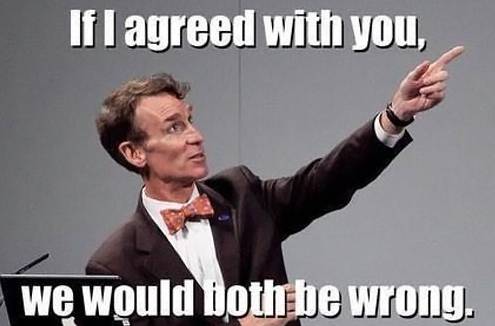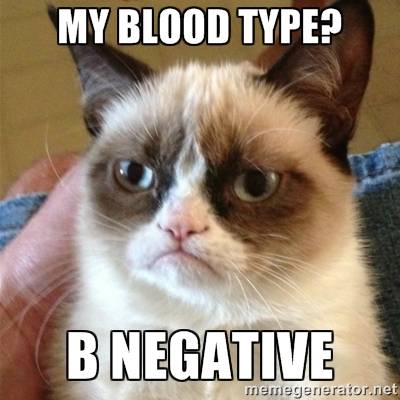We’ve all been there. Facebook. Twitter. Instagram. The Daily Mail. Somebody is wrong, and the urge to wade in is almost impossible to resist.
In the same vein, prominent people in the health and fitness world are increasingly posting articles bashing something or other, and often bashing each other as well.
Bashing deadlifts because you can get injured if you do them badly versus bashing people who don’t do deadlifts because you need a barbell to get strong. Bashing low-carb diets because eating a lot of fat might make your cholesterol go up versus bashing low-fat diets because carbs are the cause of all disease.
I can’t be the only person that finds this tedious. I am also certain that everyone who falls into one of these camps is wrong. Using the paleo diet as an example, I’ll cover some of the science behind why so many people are wrong, and what’s stopping us being less wrong.
We Are All Biased
When it comes to informing our opinions, we all tend to do the following:
- We selectively follow the people and sources we believe in, which increasingly push us further into our own belief systems.1
- When somebody provides evidence that disagrees with our own views, we spend more time examining the data or study for flaws than we would if the evidence agreed with what we think already.2
- If we’re told one of our beliefs is wrong, we automatically tend to believe our original viewpoint more strongly, even if our original supporting evidence is discredited.3
With all the media and information available to us, we have an infinite source of readily accessible information to evaluate. Consequently, the innate human behaviors described above are magnified.
This is why pro-vaccination campaigns don’t increase vaccination rates, why disagreeing with vegans won’t make them eat meat, and why you will never win an argument on Facebook.4

Everybody Is Wrong
Because it’s a community I spend a lot of time within, I see a lot of rigid opinions expressed by “paleo” followers. I like paleo because the basic ideas make sense to me. In short, we’re fat and sick because we’ve strayed too far from the food, sleep, activity, play, and community we need to be healthy. Plus, paleo says I get to eat steak and spend more time in bed. Sweet.
However, as with almost any health theory, paleo has had to fill in some knowledge gaps with ideas that aren’t 100% scientifically ironclad. This is where problems arise.
In response to a recent increasing interest in paleo in the UK, a number of dieticians came out in opposition to it. Their rationale was generally based on the idea that exclusion diets are dangerous and can lead to deficiencies in certain vitamins and minerals. Other lines of criticism included eggs raising cholesterol and red meat causing cancer. Both of these foods are encouraged in the paleo diet.
“[A]s with almost any health theory, paleo has had to fill in some knowledge gaps with ideas that aren’t 100% scientifically ironclad. This is where problems arise.”
While it is true restrictive diets may push people into disordered eating if they are inclined in that way, there is no evidence that a paleo diet will lead to heart disease, cancer, or nutrient deficiencies. In fact, foods recommended by the paleo diet are some of the most nutrient-dense available.5 For instance, the burden of evidence shows eggs and unprocessed red meat are full of essential nutrients, and are beneficial for health.6,7
I challenge anybody to find me a deficiency that I’m at risk of if I eat a lot of vegetables, meat and fish, some fruit and nuts, and some fermented foods.
The Other Side Is Wrong Too
But don’t think that strict paleo advocates are getting away lightly. They’re wrong, too.
A good example of this is the stance on grains (especially wheat) and legumes (beans, lentils, peas), which are excluded by paleo. A number of health writers have argued back and forth about the effect of wheat (and gluten) on the gut and disease, and I’m sure this will continue. However, our best evidence currently suggests fewer than 10% of people have some kind of sensitivity to gluten or grains.8 Even if it’s more than this, there is no evidence that all humans should exclude grains and legumes from their diet.

On the contrary, a number of populations and studies show eating legumes improves both gut and metabolic health. In fact, I haven’t seen a single robust study that shows well-prepared beans are anything but healthy.9,10
There is also increasing evidence that including some whole grains in the diet as part of a healthier lifestyle pattern (people who eat more whole grains also smoke less, drink less, and are more active) is beneficial.11 The caveat is some people (maybe a lot of people) will benefit more from excluding grains and/or legumes.
Check Your Thought Process
What are you thinking right now? Maybe you’ve picked one of the studies I’ve listed that you disagree with and are frantically Googling to find out why I’m wrong, too. Or maybe you’re neutral to the issue I picked, which means you’ll be much more objective. That’s just how our brains work. This is where it’s useful to remember there are three sides to every story.
“Maybe you’re actually wrong, and you could be doing something differently to improve your health and performance.”
Though some people enjoy baiting others and providing disinformation for fun, most people out there sharing their opinions are certain they are right. More than that, most people are certain they are helping others by providing the opinions and information they put their names to.
I used to be certain that grains and legumes were evil for all people until I took a look at the science and found there was nothing to support those blanket statements. Maybe the science just isn’t there yet. Or maybe I was wrong. Or maybe I’m still wrong.
Why It’s Okay to Be Wrong
In 1925, when defending academic freedom in court, American attorney Dudley Field Malone reportedly said, “I have never learned anything from any man who agreed with me.”
Isn’t it possible the people who disagree with you have some information that you don’t? As we learn more, there is also more to learn – and nobody knows everything. Spending time examining the views of people with whom you disagree will only help broaden your evidence base. Maybe you’re actually wrong, and you could be doing something differently to improve your health and performance.
Broadening your knowledge will also reduce the amount of time you spend angry after reading something you think is wrong. We even have a good amount of data to support the fact that negative thoughts can be, quite literally, the death of you.12 You’re already stressed. You just don’t need that extra aggravation.

Playing the Odds
You will never find scientific evidence to show that one diet, supplement, or exercise will work for everybody. Most of the time, we’re just playing the odds and using what appears to be best for the most people. For instance, creatine, one of the most-studied performance-enhancing supplements, has no benefit for 20-30% of people.13 But its use is widely recommended for strength athletes because they are more likely to get a benefit from it than not.
“[W]e should always treat any rigid statement with scepticism, particularly in the health and fitness world.”
The human body is a fascinating and complex construction, and the only thing we truly know is that we don’t understand it nearly as well as we’d like to. As a result, we should always treat any rigid statement with scepticism, particularly in the health and fitness world.
Be Different
Unless you take your knowledge out for a spin, you’ll never know its limitations. With that in mind, try the following:
- Discuss things with people who disagree with you. “Discuss” does not mean argue.
- Give the evidence that supports your own ideas the same scrutiny you give to things with which you don’t agree.
- If you still remain certain of something, it’s okay stick to your guns. But you’re never going to change somebody else’s mind by attacking their beliefs.
Only we ourselves can really figure out what works best for us as individuals, be that in our diet or in training. The upshot is that what works for you may not work for somebody else. That’s okay. Educate yourself, experiment, and be nice to those who disagree with you. They might know something you don’t.
Let me know if you disagree.
Related Articles You May Enjoy:
- How To Read and Respond to Fitness Info on the Internet
- The Great Egg Debate: Why You Should (and Should Not) Eat Eggs
- 4 Mistakes Coaches Make on the Internet
- Today’s New Pulse Beat Fit Articles
References:
1. Gunther AC., et al. “Partisan evaluation of partisan information“. Communic Res. 2012;39(4):439–457
2. Edwards, K., et al., “A disconfirmation bias in the evaluation of arguments.” J Pers Soc Psychol. 1996;71(1):5–2
3. Lord CG., et al. “Biased assimilation and attitude polarization: the effects of prior theories on subsequently considered evidence.” J Pers Soc Psychol. 1979;37(11):2098–2109
4. Nyhan B., et al. “Effective messages in vaccine promotion: a randomized trial.” Pediatrics. 2014 Apr;133(4):e835-42.
5. Cordain L., et al. “Origins and evolution of the Western diet: health implications for the 21st century.” Am J Clin Nutr. 2005 Feb;81(2):341-54.
6. Wood, T., “The Great Egg Debate: Why You Should Eat Eggs, Why You Shouldn’t Not Eat Eggs.” Pulse Beat Fit. Last accessed January 7th, 2015.
7. Binnie MA., et al., “Red meats: time for a paradigm shift in dietary advice.” Meat Sci. 2014 Nov;98(3):445-51.
8. Catassi C., et al., “Non-Celiac Gluten sensitivity: the new frontier of gluten related disorders.” Nutrients. 2013 Sep 26;5(10):3839-53.
9. Rochfort S., et al., “Phytochemicals for health, the role of pulses.” J Agric Food Chem. 2007 Oct 3;55(20):7981-94.
10. Rebello CJ., et al., “Whole grains and pulses: a comparison of the nutritional and health benefits.” J Agric Food Chem. 2014 Jul 23;62(29):7029-49.
11. Wu H., et al., “Association Between Dietary Whole Grain Intake and Risk of Mortality: Two Large Prospective Studies in US Men and Women.” JAMA Intern Med. Published online January 05, 2015.
12. Phillips DP.,et al. “The Hound of the Baskervilles effect: natural experiment on the influence of psychological stress on timing of death.” BMJ. 2001 Dec 22-29;323(7327):1443-6.
13. Lemon PW., “Dietary creatine supplementation and exercise performance: why inconsistent results?” Can J Appl Physiol. 2002 Dec;27(6):663-81.
Image 1 courtesy of XKCD.






